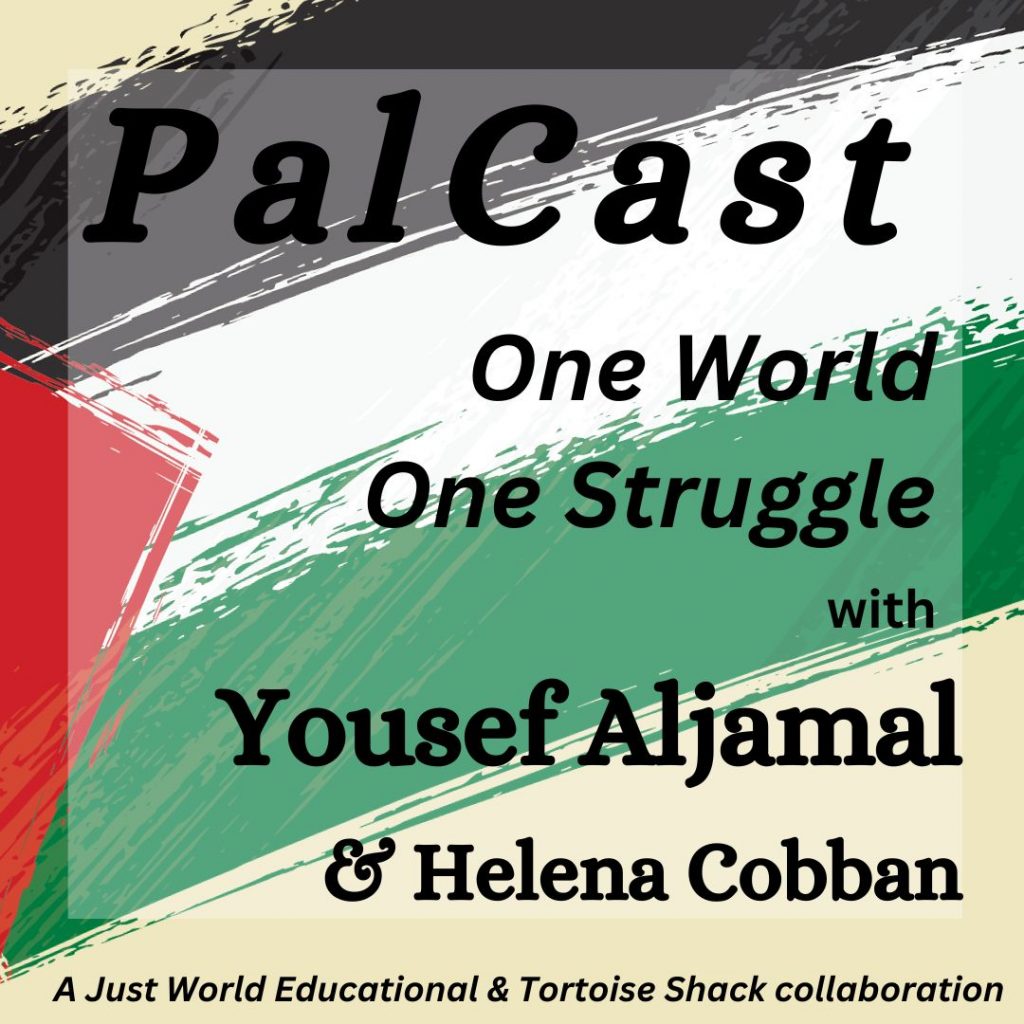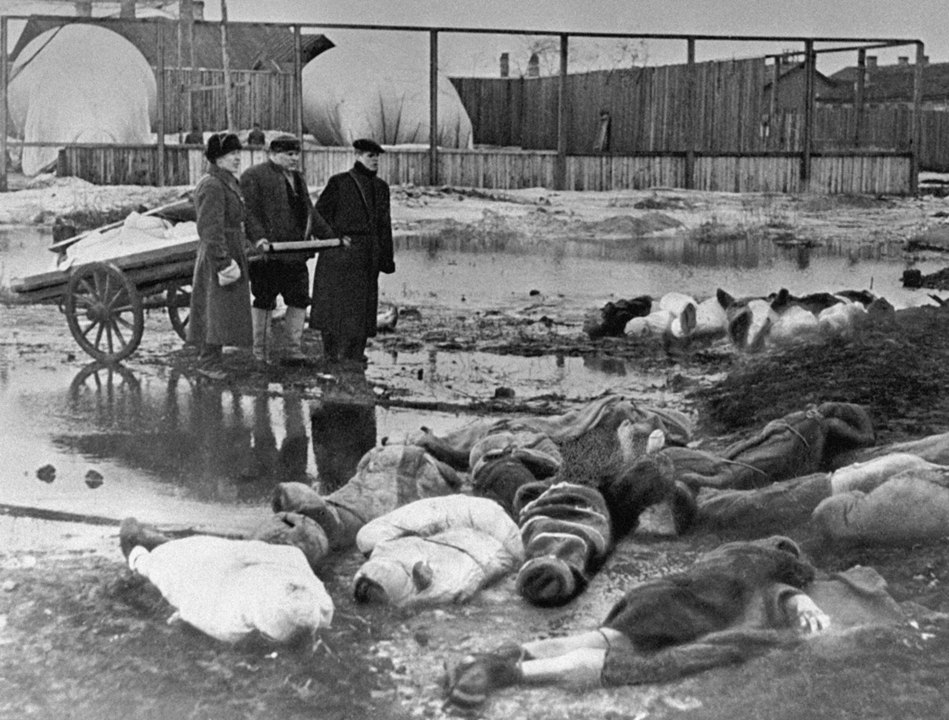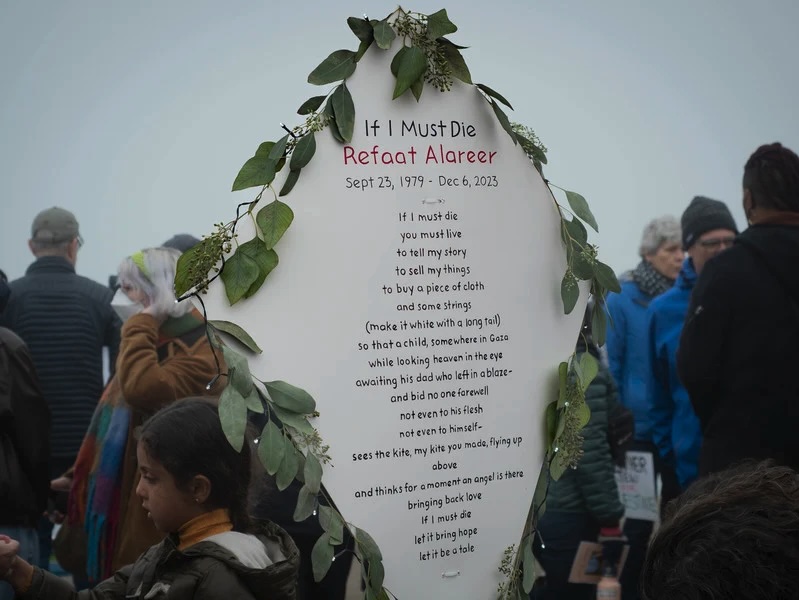The photo above, by Maureen Clare Murphy, shows a kite displayed at a memorial gathering held in Chicago for my friend the assassinated Gaza writer Refaat Alareer
I haven’t written much here recently. In the past two months I’ve been really busy with the book-publishing business, from which I’d earlier hoped I could start to retire. But my publishing company, Just World Books, has long had a strong list of titles on Gaza, and by Gaza-Palestinian authors, so there’s been a huge run on our books… Plus, on December 6, our wonderful author/editor Refaat Alareer, a professor of literature at the Islamic University of Gaza, was assassinated by Israel; and I’ve been doing what I could to defend his legacy and ensure that the works he edited (and contributed to) get as wide a distribution as possible.

I have also been working on a longer essay for a national publication about the clearly massive impact the Gaza crisis has already had, and will continue to have, on the dynamics of global power. Stay tuned for that… Oh, and with my dear Gaza-Palestinian colleague Dr. Yousef Aljamal and a talented new Irish pal called Tony Groves we’ve gotten our new Palestine-focused podcast, the PalCast, up and running. Hey, we’ve now released eighteen episodes of it! (Catch it at Apple, Spotify, or other good podcast platforms.)
So of course this means I’ve continued to follow all the developments unfolding in (and swirling very broadly around) the Gaza crisis pretty closely. I’ve also been networking with numerous other individuals and organizations that are pushing for a speedy ceasefire there and the launching of a serious, U.N.-led project to end Israel’s occupation of Gaza, the West Bank (including E. Jerusalem), and Golan, once and for all.
In these contacts, I’ve encountered quite a few people outside Gaza who admit to feeling “hopeless” to effect change there; and many of those people, and others, frequently express pity for the situation of the 2.3 million people of Gaza. I’ve thought quite a lot about that stance, and my general reaction is as follows: #1, Hopelessness/despair cannot be an option, especially for those of us who are outside Gaza. #2, I’m increasingly of the view that “pity” is a patronizing, othering, and somewhat self-paralyzing kind of response to the situation Gaza’s people are facing, under Israel’s truly outrageous genocidal assault.
What I would urge is that those of us outside Gaza should instead view the situation of the people there with a radical and empowering form of empathy for all of them, and with admiration for the steadfastness and resilience they and their society have shown in the face of Israel’s almost unfathomable cruelty.
I have Palestinian friends who on occasion have railed against the pressure they sometimes feel from their political allies to remain “resilient”, or at least to have to perform “resilience” for those allies. I completely understand those Palestinians’ resistance to such pressures: everyone who is under stress needs to be able to take time out from performing “resilience” whenever, or for however long, she or he needs. But for my part, as I try in these terrible months to be a good ally to Palestinians in their quest for rights, dignity, and justice, I think it is definitely worthwhile to highlight the truly inspiring resilience and steadfastness that the Palestinians in Gaza have been demonstrating day after day after devastating day.
The men and boys scraping with bare hands to free family members or neighbors from the rubble of pancaked buildings.
The parents facing terrible upsets in their families’ lives like death, mutilation, disease, or repeated uprootings between totally inadequate places of shelter… and then just dealing with those upsets; working hard to minimize the impacts they have on the children and other vulnerable family members; trying to retain for their families some sense of togetherness and the possibility of better days to come.
The teachers and community activists who organize games and singalongs with the children.
And of course, all those amazing medical workers.
How could we not admire those people? And truly I don’t pity them at all. I feel extremely deep empathy for all their travails: an empathy that constantly reinforces my determination to be the best ally I can be, to work as effectively as I can with my Palestinian friends and other pro-justice advocates around the world so that together we can end the misery of Palestinians in Gaza and everywhere else as speedily and as totally as is possible.
(If I pity anyone in that part of the world, to be honest, these days it is the Jewish Israelis. I understand that the events of October 7 broke something very deep in their national psyche, and that they currently find themselves with their once-vaunted military bogged down in Gaza, their political leadership in chaos, and no clear end in sight.)
But back to the Palestinians of Gaza. Truly,the resilience of their society has been remarkable; and it has had tangible political consequences. Remember back in October when WaPo columnist David Ignatius and others were expressing optimism that, under the pressure of Israel’s bombardment, the people of Gaza might soon rise up against Hamas? Hasn’t happened… And it is extremely unlikely that it will happen. My parents were in London during the Nazi Blitz, and I grew up with their many stories of how that went. (Short version: the bombardments only strengthened the determination of Londoners to fight back against the Nazis…)
Or, what is perhaps an even stronger comparison: the terrifying siege and repeated, massive assaults that other Nazi armies inflicted on the people of Leningrad. The Nazi “Army Group North” besieged Leningrad (today, St. Petersburg) from September 1941 through January 1944. Think about it: nearly 900 days. Roughly half of the city’s initial population of 3.4 million perished during the siege. The Red Army lost more than a million killed, captured, or missing, and 2.4 million wounded and sick.

The whole of the Wikipedia page on the Siege of Leningrad is worth reading these days…
As retired Indian diplomat M.K. Bhadrakumar wrote recently:
The Nazi leadership aimed to exterminate Leningrad’s entire population by enforced starvation. Death by starvation was a deliberate act on the part of the German Reich. In the words of Joseph Goebbels, Adolf Hitler “intended to have cities like Moscow and St Petersburg wiped out.” This was “necessary”, he wrote in July 1941, “because if we want to divide Russia into its individual parts,” it should “no longer have a spiritual, political or economic centre.”
Hitler himself declared in September 1941, “We have no interest in maintaining even a part of the metropolitan population in this existential war.” Any talk of the city surrendering had to be “rejected, as the problem of keeping and feeding the population cannot be solved by us.”
Simply put, the population of Leningrad was left to starve to death – much like the millions of Soviet prisoners of war held by the Wehrmacht. The historian Jörg Ganzenmüller later wrote that this form of mass murder was cost-effective for Berlin, for, it was “genocide by simply doing nothing”.
January 27, by the way, will be the 80th anniversary of the date on which the Red Army was finally able to lift the Siege of Leningrad. The only significant force that helped them achieve that was “General Winter”, given the inability of the German armies to continue to provision themselves through those last frigid weeks of January 1944.
Notable: throughout that whole, terrifying siege-and-bombardment of Leningrad, the city’s people never “rose up” against their Soviet rulers.
I’ve been thinking quite a bit about the siege of Leningrad these past few days. I feel intense admiration for the endurance they showed. But I also feel admiration for the skill and commitment of the Red Army formations that relieved that siege and by doing so made a huge contribution to turning back the forces of Nazi expansionism that had been rampaging across the whole of Eastern Europe; and those red Army units thereby helped turn the tide of world history decisively against the Nazis.
I am really, really glad they were able to do that. I am not now and never have been (!) an adherent of Soviet-style Communism. Over the decades I’ve expressed numerous criticisms of their policies. But still, we can can all surely not just admire the skill and commitment of the Red Armies, but also actively appreciate the significant contribution those armies made—in Leningrad and elsewhere—to saving the world from the appetites and cruelties of the Nazis.
My attitudes toward Hamas’s military achievements in the Gaza war run roughly parallel. (Actually, over the years, I’ve been able to meet, interview, and interact with a non-trivial number of Hamas leaders and on-the-ground activists, and my judgments of their movement are far less critical than my judgments of Soviet Communism. Fwiw.)
But whatever your attitude toward Hamas as a movement, I think most people today would have to recognize that in Gaza, the Hamas fighters and their political-wing colleagues have registered several notable operational and political achievements:
- On October 7, Hamas’s fighting wing, the Qassam Brigades, achieved deep operational surprise and successfully implemented a complex plan to burst out from the Gaza concentration camp and seize control of several nearby Israeli military command centers, hobbling the IDF’s ability to coordinate a response. As I wrote here, 463 of the 1,261 Israelis and Israeli residents who were killed that day were serving members of the military. (The main failure of that operation was the brigades’ failure to exert adequate discipline over the hordes of “just regular Gazans” who also burst out of the Strip that day.)
- The QB had also evidently prepared very well for the predictably harsh Israeli counter-attack, including by having built extensive warrens of underground passages and command centers throughout several years prior to October 7. On that day, the Israelis slapped a very tight siege on Gaza and unleashed bombardments of unprecedented severity against it. A month later they sent massive ground forces into the Strip. But they could not prevail and force a Hamas surrender. As late as January 15, 2024, Hamas was still able to send a sizeable barrage of rockets against Israel—from a portion of Northern Gaza the IDF had long ago claimed to subdue.
- Toward the end of November, during the seven days of “humanitarian pause” with Israel, the QB proved that their communications channels (among themselves, and with their political-wing colleagues outside Gaza) remained intact and their command structure even in northern Gaza had retained its integrity. Hostage releases agreed by pols in Qatar were implemented by the QB people on the ground with only a few hiccups.
- Despite all the truly terrible privations visited on Gaza’s people the civil-society and community networks within Gaza that had been built up by Hamas’s Muslim Brotherhood antecedents even before the MB created Hamas in 1987, remained generally robust and focused on community survival. There has been some evidence of undisciplined takings from food trucks. But by and large the people of Gaza have dealt with their devastation with truly admirable dignity and community-mindedness. There have been no large-scale clashes between different segments of the community and no emergence of groups calling for the overthrow of Hamas. (See: London Blitz, etc, above.) The Gaza Palestinian have gritted their teeth and just carried on doing what they could.
- Through this combination of military-technical smarts and community resilience Hamas and its allies in the Gaza resistance have succeeded in forcing Israel to fight its longest war ever. This achievement is spectacular, especially given that Israel’s whole broad national security doctrine has been built since 1948 on achieving a speedy, decisive victory over any opposing forces, so that the many reserve soldiers in the IDF can be speedily demobilized and returned to the civilian economy. A few weeks ago, the Israeli leaders announced a small-scale drawdown of the forces serving in Gaza; but probably more than 200,000 of the 350,000 reservists called up in early October are still serving. That has broad impact.
- The ferocity of the Israeli assault on Gaza as well as its long duration have meanwhile had considerable political impact both throughout West Asia, and worldwide. The scale (and global visibility) of the suffering that Israel has inflicted on Gaza has, over the weeks since October 7, put increasing pressure on governments everywhere to take sides publicly regarding not just the terrible conflict inside Gaza but also the Palestine-Israel dispute more broadly.
- At this level, Israel and its sole sizeable remaining backer, the United States, have appeared increasingly isolated on the world stage. By the end of December, not just the vast majority of the Global South but also some long-time Washington allies in Europe like France and Spain had come out for the Gaza ceasefire that Israel was still steadfastly resisting. And more broadly, too, global pressure has been mounting fast for speedy, palpable progress to the implementation of the two-state solution to the Palestine-Israel dispute that had long been the U.N.’s favored outcome—but to which Israel’s government has remained adamantly opposed.
It is this last set of achievements, at the global-political level that lead me to actually applaud Hamas’s achievements since October 7. How many decades now has the world waited for Israel to end its military occupations of Gaza, the West Bank, and Golan, and for the rights of the legitimate residents of those areas to be fully restored?
It is more than 56 years since the U.N. Security Council adopted Resolution 242, that called on Israel to leave the lands it had occupied in June 1967 in exchange for peace. It is over 50 years since the UNSC adopted Resolution 338, which reiterated that demand.
Since then, Israel has withdrawn wholly from Egypt’s Sinai Peninsula in return for peace, and has withdrawn very partially in Syria’s Golan (though soon after that it actually, and quite illegally, annexed the rest of Golan.) Israel has launched two extremely destructive invasions of Lebanon. It has implanted more than 700,000 illegal Israeli settlers in the West Bank, including East Jerusalem, and has encircled most of the Palestinian cities in the West Bank with its outrageous Apartheid Wall. It has launched mega-lethal, colonial-style punishment raids against Palestinians in both the West Bank and Gaza… And while it committed all those gross violations of international law it has continued to receive ironclad backing from the United States.
It is that deeply iniquitous system that the Hamas fighters and their allies have been confronting; and through the steadfastness and smarts they have displayed in Gaza they have forced the whole Palestine Question back onto the international agenda more forcefully than has ever been the case previously, since as long ago as 1948.
For those of us who are citizens of Western countries, this faces us with a challenge. Are we prepared to stand up and say that the whole iniquitous (and deeply lethal and destabilizing) system of US-Israeli hegemony over Arab-Israeli peacemaking needs to end? And that we will dedicate ourselves to working to make this happen? For my part, I am prepared to stand by both statements. That’s why I doff a cap of appreciation to Hamas and their allies for their achievements in Gaza. And I reach out with admiration and deep, deep empathy to the so-sorely-tried people of Gaza. Their steadfastness truly inspires me and gives me hope that this better world we seek can indeed, one day soon, become a reality.



Dear Helena,
Peace.
Your article is one of the best pieces I have read so far on Gaza. I agree with you totally that it is empathy and admiration that the people of Gaza deserve, not pity. How can one not empathize with a people who have suffered so much for so long ? How can one not admire the steadfastness of a community that has continued to resist the military might and the political power of not just the state of Israel but also that of the United States of America ?
You have challenged the citizens of the West to help expedite the demise of what my dear friend, Ilan Pappe, calls the Zionist project. Your challenge is significant. For the Western rejection of a project rooted in racism, shaped by colonialism and sustained by apartheid structures of governance is that one development which will force the Israeli elite to come to terms with the legitimate aspiration of the Palestinian people for their own independent, sovereign State. That is the key to peace and harmony in West Asia and North Africa (WANA)
Thanks for your support, dear Chandra. It means a lot.
I also admire the work you, Joseph Camilleri, and Richard Falk have been doing leading the “Saving Humanity and Planet Earth” project (SHAPE).
For other interested folks reading this, you can download the statement SHAPE issued recently on the Gaza crisis here (a PDF).
~ Helena